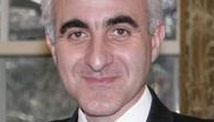Cyprus is not at peace with Turkey

- In June CNN column, David Frum said Cyprus could be a model for Mideast peace
- Cyprus ambassador to U.S. says no genuine peace in Cyprus
- Kakouris: Peace means rule of law, justice, democracy, human rights
- He says Cyprus president having talks with head of Turkish Cypriot community
Editor's note: Andreas S. Kakouris is ambassador of the Republic of Cyprus to the United States.
(CNN) -- In a column on CNN.com on June 7, David Frum wrote, "Cyprus may offer a good model for how the Israeli-Palestinian dispute might eventually be resolved" because "peace has in fact settled upon Cyprus." Nothing could be further from the truth.
Peace is not merely the absence of war, but the presence of the rule of law, justice, democracy and human rights. All of these elements are missing because of the continuing Turkish occupation of nearly 37 percent of the territory of the Republic of Cyprus and massive violations of human rights and fundamental freedoms, the direct result of an armed illegal invasion by Turkey in 1974.
Frum correctly points out that Turkish forces inflicted heavy casualties on Greek Cypriots and drove some 180,000 from their homes in what is today the occupied north of the island. To put this number into a U.S. context, it would be the equivalent of nearly 90 million U.S. citizens being forcibly expelled from their homes and refused the right to return. Today, 43,000 Turkish troops still occupy a sovereign nation, member state of the United Nations and the European Union.
Frum refers to the "fuzzy legal status of the north." There is nothing fuzzy about the status of the entity calling itself the "Turkish Republic of Northern Cyprus." The Security Council has condemned this act of secession as legally invalid and called for its withdrawal. It also called upon all states not to recognize, facilitate or in any way assist the secessionist entity.
Turkey stands alone in violation of the will of the international community. It is the only country to recognize the "TRNC" and is the only country that does not recognize the Republic of Cyprus and its government.
Furthermore, Turkey has treated the occupied area of Cyprus as if it were one of its own provinces and has illegally settled more than 160,000 mainland Turkish citizens as part of its policy of changing the demographic character of the island. It is Turkey's occupation and policies that aim to consolidate the occupation and division which are the barriers to peace.
Frum incorrectly refers to "Greek Cyprus" and "Turkish Cyprus." Language and correct nomenclature are important if we are to avoid creating wrong impressions and linguistic fait accomplis.
What he refers to as "Turkish Cyprus" is in fact the Turkish occupied area in the Republic of Cyprus and what he refers to as "Greek Cyprus" is in fact the government controlled areas of the Republic of Cyprus.
Similarly, Frum points out Greek Cyprus is in the European Union and uses the euro, while Turkish Cyprus does not. Facts are vital here: The Republic of Cyprus is a member state of the European Union since 2004, but EU rules and regulations are suspended in the occupied area in the north.
It is worth noting however, that tens of thousands of Turkish Cypriots have applied and received their Republic of Cyprus passports and ID cards. Today, a Turkish Cypriot can travel, reside, work and study in any EU country. In essence, Turkish Cypriots are EU citizens because of their Republic of Cyprus citizenship.
Currently, direct talks are under way between President Demetris Christofias and the new leader of the Turkish Cypriot community Dervis Eroglu to find a solution. The framework for a solution is well known and found in numerous United Nations Security Council resolutions and high-level agreements, namely a bizonal, bicommunal federation, with a single sovereignty, single international personality, single citizenship and political equality as described in the relevant UN Security Council Resolutions and with its independence and territorial integrity safeguarded.
A solution should also be in accordance with the values and principles on which the European Union is founded, of which Cyprus is a member and Turkey seeks to be a member.
This is what President Christofias is committed to, and we sincerely hope Mr. Eroglu too: A solution for the people and by the people that will end the illegal occupation and reunite the island and its people. For this to happen however, the key remains with Turkey.
Until such time, peace will not have settled upon Cyprus. So, while there may be "quiet" and daily interaction between Greek and Turkish Cypriots, there can be no peace or an illusion of peace with an illegal occupation in effect. Surely Frum is not suggesting that the unacceptable status quo created by the illegal Turkish invasion and occupation and the ensuing and ongoing violations of human rights and fundamental freedoms is a model to be accepted or replicated?
The opinions expressed in this commentary are solely those of Ambassador Andreas S. Kakouris.
